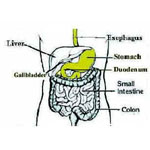|
|
 |
|
Gastroenterology |
 |
 |
 |
|
|
|
INTRODUCTION TO THE
Gastroenterology |
|
|
|
The spectrum of gastroenterology is quite wide and
includes diseases of the esophagus, stomach, small
intestine and large intestine (colon), pancreas, bile
ducts, gallbladder and liver. Gastroenterology is a
branch of medicine concerned with digestive diseases.
The practice of gastroenterology concentrates on the
diagnosis and treatment of diseases involving the
esophagus, stomach, small intestine and large intestine
(colon), liver, gallbladder, and pancreas. This medical
field is really a subspecialty of Internal Medicine, as
is, for example, Cardiology, which deals with diseases
of the heart. |
|
|
A Gastroenterologist is a specialist who is first
broadly trained in Internal Medicine and subsequently in diagnosing and
treating disease of the digestive system. Frequently, a
Gastroenterologist is called in cases of abdominal pain,
rectal bleeding, or change in bowel habits when the
diagnosis is unclear or where specialized diagnostic
procedures are necessary. Most Gastroenterologists are
certified by the American Board of Internal Medicine and
then receive additional training in Gastroenterology. To
qualify for Board certification, an individual must have
completed four years of college, four years of medical
school and have received a degree in medicine. Then
he/she must complete an additional four to six years of
specialty training in Internal Medicine and
Gastroenterology. After several years of clinical
practice, the doctor must successfully complete an
extensive series of examinations. All of our doctors are
Board Certified in Gastroenterology.
in Internal Medicine and subsequently in diagnosing and
treating disease of the digestive system. Frequently, a
Gastroenterologist is called in cases of abdominal pain,
rectal bleeding, or change in bowel habits when the
diagnosis is unclear or where specialized diagnostic
procedures are necessary. Most Gastroenterologists are
certified by the American Board of Internal Medicine and
then receive additional training in Gastroenterology. To
qualify for Board certification, an individual must have
completed four years of college, four years of medical
school and have received a degree in medicine. Then
he/she must complete an additional four to six years of
specialty training in Internal Medicine and
Gastroenterology. After several years of clinical
practice, the doctor must successfully complete an
extensive series of examinations. All of our doctors are
Board Certified in Gastroenterology. |
|
|
| Frequently, a
Gastroenterologist is called in cases when the
diagnosis is unclear or where specialized diagnostic
procedures are necessary. A Gastroenterologist
treats a broad range of conditions, including, but
not limited to: |
| |
* Abdominal Pain
* Abnormal Xray findings
* Colon Cancer
* Colon Polyps
* Colon Screening Exams
* Constipation
* Crohn's Disease
* Diarrhea
* Difficulty Swallowing
* Diverticulosis
* Esophageal Reflux
* Gastritis
* GERD
* Heartburn
* Hemorrhoids
|
* Hepatitis
* Hiatal Hernia
* Indigestion
* Irritable Bowel Syndrome
* Jaundice
* Liver Disease
* Malabsorption
* Nausea Diarrhea
* Post-OperativeColon Tests
* Rectal Bleeding
* Spastic Colon
* Ulcers
* Ulcerative Colitis
* Unexplained Weight Loss
* Vomiting
|
|
|
|
DOES A GASTROENTEROLOGIST PERFORM
SURGERY?
A Gastroenterologist does not perform surgery. His work
is limited to diagnosis and medical treatment. However,
under the broad classification of surgery,
Gastroenterologists do perform such procedures as liver
biopsy and endoscopic ("scope") examinations of the
esophagus, stomach, small and large bowel. Also, the
Gastroenterologist frequently works with surgeons before
and after an operation in helping select the best
operation for a particular patient, and in providing
follow-up care relevant to the particular digestive
disorder.
limited to diagnosis and medical treatment. However,
under the broad classification of surgery,
Gastroenterologists do perform such procedures as liver
biopsy and endoscopic ("scope") examinations of the
esophagus, stomach, small and large bowel. Also, the
Gastroenterologist frequently works with surgeons before
and after an operation in helping select the best
operation for a particular patient, and in providing
follow-up care relevant to the particular digestive
disorder. |
|
|
|
|
WILL I STILL NEED MY FAMILY DOCTOR?
Yes, you will. Following consultation, you will usually
be referred back to your family doctor for follow-up
unless your case requires the continued attention of the
Gastroenterologist. Even if you have a problem which
requires continuing treatment by a Gastroenterologist,
your family doctor will still advise and/or treat you
for all other non related medical problems. Your family
doctor will continue your treatment if and when your
problem no longer requires the attention of a
Gastroenterologist. Your family doctor and
Gastroenterologist often consult each other about your
problems and care. |
|
|
A gastroenterologist
surgeon has a particular interest in diseases digestive tract. To become proficient in the
treatment and management of these conditions, a
gastroenterologist must undergo training in both
internal medicine and advanced training in problems of
the digestive tract.
diseases digestive tract. To become proficient in the
treatment and management of these conditions, a
gastroenterologist must undergo training in both
internal medicine and advanced training in problems of
the digestive tract.
Training:-
A gastroenterologist must first complete a 4-year
college degree followed by 4 years of medical school at
which time they receive a medical degree. The next step
is a 3-year residency in internal medicine. At that time
a physician may elect to continue on to a specialty in
gastroenterology.
A gastroenterology fellowship is 2 to 3 years during
which a physician learns to evaluate and manage
digestive diseases. This training encompasses conditions
that may be seen in an office or in a hospital setting
and instruction in how to perform diagnostic endoscopy
procedures, such as colonoscopy. In all, a
gastroenterologist has undergone a minimum of 13 years
of formal classroom education and practical training
before becoming a certified gastroenterologist. |
|
|
|
|
|
Disclaimer - The
contents of this site are for informational purposes
only. Always seek the advice of a qualified
physician for any doubts. |
|
| |


